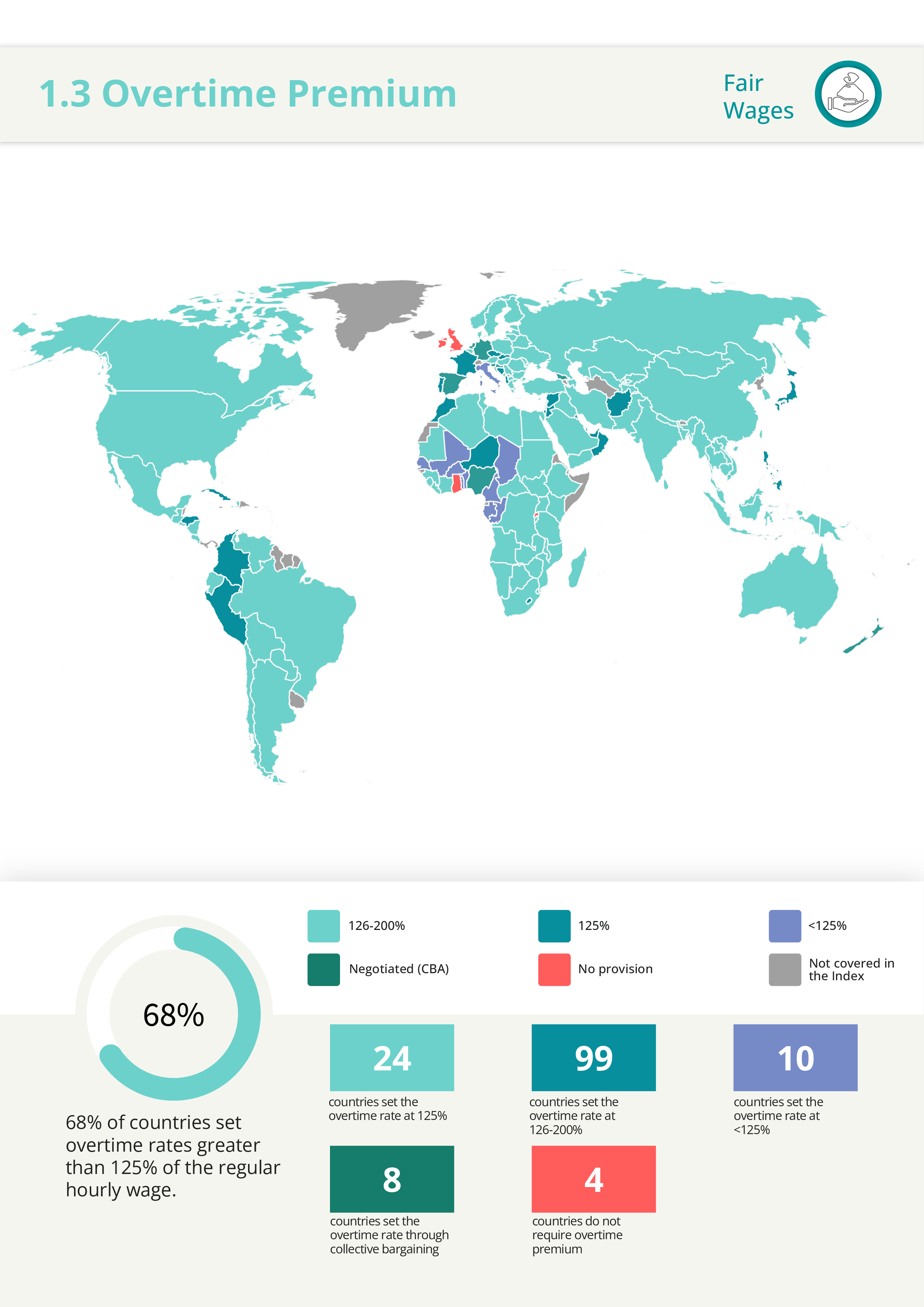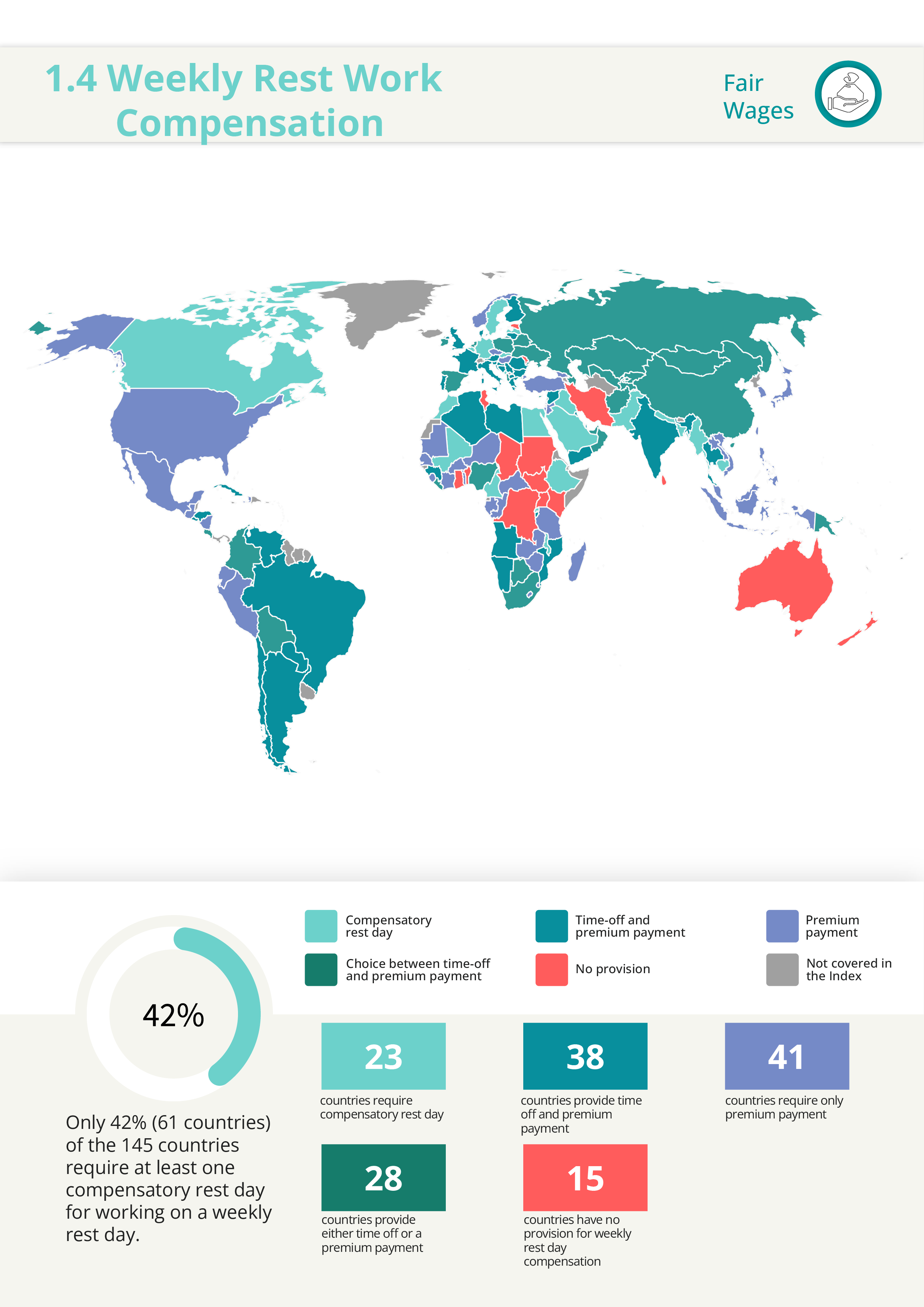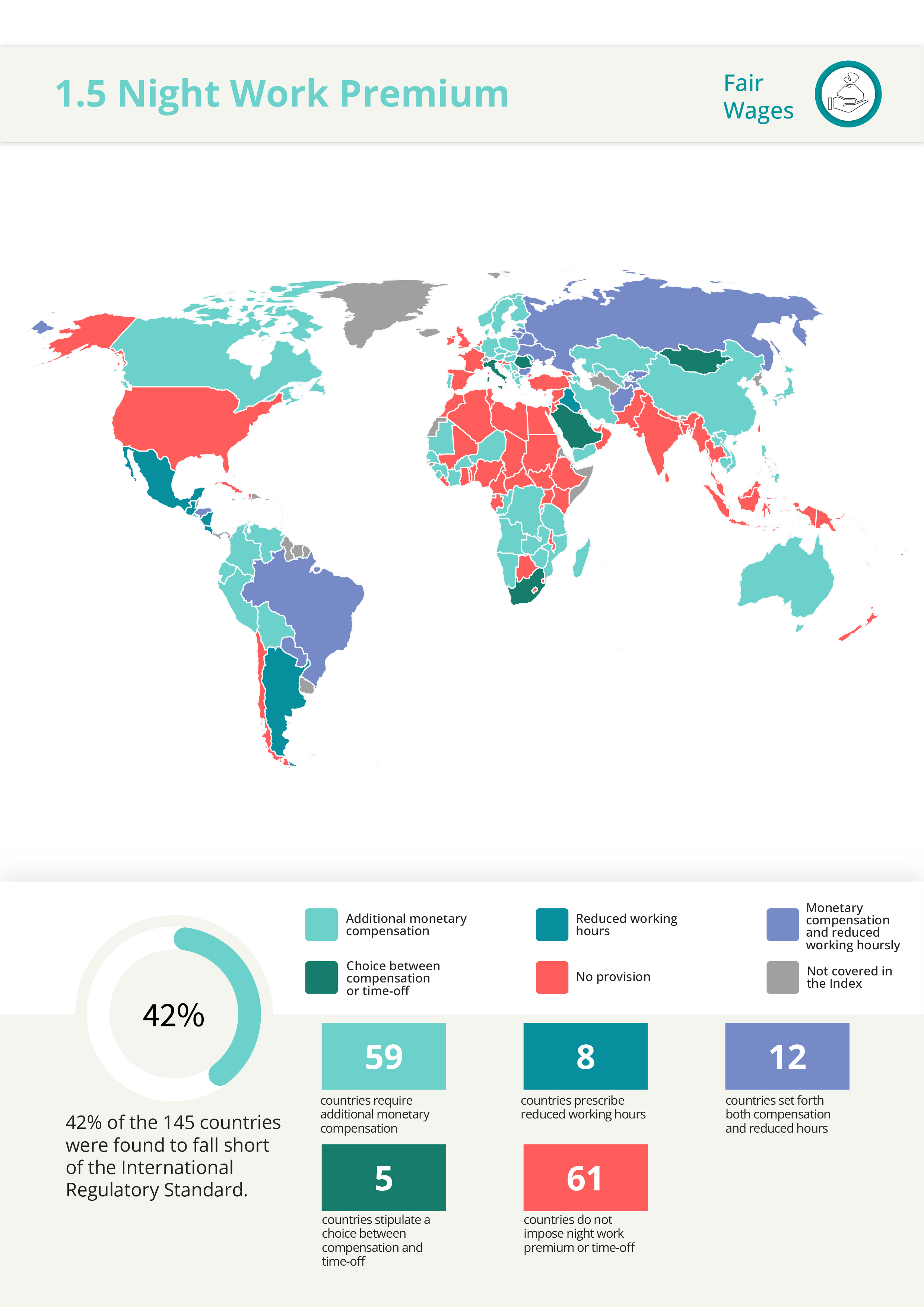Fair Wages
The Fair Wages Indicator measures whether the law stipulates minimum wages (statutory wages) or whether the wages are determined through collective bargaining. It also measures whether wages are paid regularly and timely.
Additionally, it evaluates 145 jurisdictions on their compliance with International Regulatory Standards on overtime and night work premiums alongside providing a compensatory rest day for those working on a weekly rest day.
Linkage with SDGs
1.1 eradicating extreme poverty
1.1.1 population living below the international poverty line ($1.25 a day)
1.2.1 population living below the national poverty line
8.5 full and productive employment and decent work for all
8.8 protect labour rights and promote safe and secure working environments for all workers
10.2.1 proportion of people living below 50 per cent of median income
10.4 progressively achieve greater equality
10.4.1 labour share of GDP
1.1 Minimum Wage
Does the legislation or collective negotiation set and determine the minimum wages in the country?
International Regulatory Standard
- Universal Declaration of Human Rights, 1948
- Minimum Wage Fixing Convention, 1970 (No. 131)
- International Covenant on Economic, Social and Cultural Rights (ICESCR)
Article 23(3) of the Universal Declaration of Human Rights, Article 3 of the ILO’s Minimum Wage Fixing Convention, 1970 (No. 131), and Article 7 of the International Covenant on Economic, Social and Cultural Rights, 1966 (Fair Wage clauses) require that all workers have the right to just and favourable remuneration so that workers are ensured fair wages and decent living. Convention No.131 further stipulates that while determining the minimum wages, the needs of workers and their families, as well as economic factors, must be considered.
Scoring Methodology
Whether labour legislation or collective negotiation sets the minimum wages:
1: The minimum wages are determined under labour legislation, or bargaining at the sectoral or national level sets the minimum wage. The minimum wages must have been revised at least once during the past two years (with reference to 1 January 2022).
0: There is no provision on minimum wages in legislation, and in the absence of a statutory minimum wage, there is no sectoral or national level bargaining. The minimum wages have not been revised in the past two years.

1.2 Regular Wage
Does the law require regular and timely payment of wages?
International Regulatory Standard
- Protection of Wages Convention, 1949 (No. 95)
- Social Policy (Basic Aims and Standards) Convention, 1962 (No. 117)
Article 12(1) in the ILO’s Protection of Wages Convention, 1949 (No. 95) and Article 11(6) of ILO’s Social Policy (Basic Aims and Standards) Convention, 1962 (No. 117) state that wages should be paid regularly or at regular intervals (to reduce the likelihood of a worker becoming indebted). Such intervals must be fixed in national laws or regulations or by collective agreements, except where other suitable arrangements are provided that ensure wage payment at regular intervals. The legislation must set a time limit within which wages must be paid after the completion of a wage period.
Scoring Methodology
Whether labour legislation requires regular and timely payment of wages:
1: Labour legislation requires employers to ensure regular and timely payment of wages. Wage payment periods can be set at the hourly, daily, weekly, fortnightly or monthly levels.
0: Labour legislation does not require employers to ensure regular and timely payment of wages upon the completion of a wage period.

1.3 Overtime Premium
Does the law require overtime compensation to be at least 125% of the regular hourly rate?
International Regulatory Standard
- Hours of Work (Industry) Convention, 1919 (No. 1)
- Hours of Work (Commerce and Offices) Convention, 1930 (No. 30)
Article 6 of the ILO’s Hours of Work (Industry) Convention, 1919 (No. 1) and Article 7 of the ILO’s Hours of Work (Commerce and Offices) Convention, 1930 (No. 30) establish that workplaces which necessarily have to carry out work after general working hours due to certain reasons such as force majeure should develop regulations (by public authority and after consultation with employers’ and workers’ organisations, where these organisations are present) which fix the limit of additional hours in each instance and the rate of pay for overtime not to be less than one and one-quarter times (125%) the regular rate.
Scoring Methodology
Whether overtime compensation is at least 125% of the regular rate:
1: Monetary compensation for overtime is 125% or more of the regular hourly rate.
0: Overtime compensation is less than 125% of the regular hourly rate or if the legislation only requires compensatory rest/time-off for working overtime without additional monetary compensation.

1.4 Weekly Rest Work Compensation
Does the law require any additional compensation for working on a weekly rest day?
International Regulatory Standard
- Weekly Rest (Industry) Convention, 1921 (No. 14)
- Weekly Rest (Commerce and Offices) Convention, 1957 (No. 106)
Article 5 of the ILO’s Weekly Rest (Industry) Convention, 1921 (No. 14) and Article 8(3) of ILO’s Weekly Rest (Commerce and Offices) Convention, 1957 (No. 106) state that provision for compensatory rest periods should be granted, with certain temporary exceptions, except in cases where agreements or customs already provide for such periods. Article 8(3) of Convention No. 106 further requires that those working on weekly rest day(s) “shall be granted compensatory rest of a total duration at least equivalent to the period of weekly rest.
Scoring Methodology
Whether the legislation includes any compensatory measures for working on a weekly rest day:
1: The legislation requires the provision of a compensatory rest day, or workers are given both the substitute day off and a premium payment.
0: Working on a weekly rest day is compensated with only a premium payment, or employers can choose to either pay a premium or give a substitute day off.

1.5 Night Work Premium
Does the law require additional compensation for night work?
International Regulatory Standard
- Night Work Convention, 1990 (No. 171)
- Night Work Recommendation, 1990 (No. 178)
As per Article 8 of the ILO’s Night Work Convention, 1990 (No. 171), compensation for night workers (in the form of working time, pay, or similar benefits) shall recognise the nature of night work. Paragraph 8 of the Night Work Recommendation, 1990 (No. 178) stipulates that “night work should generally give rise to appropriate financial compensation. Such compensation should be additional to the remuneration paid for the same work performed to the same requirements during the day and may by agreement be converted into reduced working time”.
Article 1 of the Convention No. 171 defines night work and night worker as follows:
Night work: All work which is performed during a period of not less than seven consecutive hours, including the interval from midnight to 5 a.m., to be determined by the competent authority after consulting the most representative organisations of employers and workers or by collective agreements;
Night worker: An employed person whose work requires performance of a substantial number of hours of night work which exceeds a specified limit. This limit shall be fixed by the competent authority after consulting the most representative organisations of employers and workers or by collective agreements.
Scoring Methodology
Whether the legislation includes any compensatory measures (financial compensation or reduced working time) during night hours:
1: Monetary compensation is awarded for work during night hours or general working hours for night workers are reduced through shorter shifts or an additional day off.
0: Night work does not lead to a premium payment or reduced working hours.

Fair Wages - comparative tables
Minimum Wage Fixing Mechanism
| Region | Statutory | Negotiated | Public Sector Coverage only | National Only | No Provision | Covered Countries |
| Africa | Algeria, Angola, Benin, Botswana, Burkina Faso, Burundi, Cabo Verde, Cameroon, Central African Republic, Congo, Côte D'Ivoire, Democratic Republic of the Congo, Egypt, Eswatini, Gabon, Gambia , Ghana, Guinea, Kenya, Lesotho, Liberia, Libya, Madagascar, Malawi, Mali, Mauritania, Morocco, Mozambique, Niger, Nigeria, Rwanda, Senegal, Sierra Leone, South Africa, Togo, Tunisia, Uganda, United Republic of Tanzania, Zambia | Chad, Namibia, Zimbabwe | Egypt, Ethiopia, Sudan | South Sudan | 45 | |
| Americas | Argentina, Bolivia, Brazil, Canada, Chile, Colombia, Costa Rica, Ecuador, El Salvador, Guatemala, Haiti, Honduras, Mexico, Nicaragua, Paraguay, Peru, United States of America, Venezuela | Cuba | 19 | |||
| Asia | Afghanistan, Azerbaijan, Bangladesh, Cambodia, China, India, Indonesia, Iran, Iraq, Israel, Japan, Jordan, Kazakhstan, Kuwait, Kyrgyz Republic, Lao People's Democratic Republic, Lebanon, Malaysia, Mongolia, Myanmar, Nepal, Pakistan, Philippines, Qatar, Republic of Korea, Sri Lanka, Syria, Taiwan , Tajikistan, Thailand, United Arab Emirates, Uzbekistan, Viet Nam | Bahrain, Yemen | Oman, Saudi Arabia | Singapore, | 38 | |
| Europe | Albania, Belarus, Belgium, Bosnia and Herzegovina, Bulgaria, Croatia, Cyprus, Czechia, Estonia, France, Georgia, Germany, Greece, Hungary, Ireland, Latvia, Lithuania, Luxembourg, Malta, Moldova, Montenegro, Netherlands, North Macedonia, Poland, Portugal, Romania, Russian Federation, Serbia, Slovakia, Slovenia, Spain, Türkiye, Ukraine, United Kingdom | Austria, Denmark, Finland, Italy, Norway, Sweden | 40 | |||
| Oceania | Australia, New Zealand, Papua New Guinea | 3 | ||||
| Total Countries | 127 | 9 | 5 | 2 | 2 | 145 |
Regular Wage Payment
| Region | Timely Wage payment | Regular Wage Payment | Regular and timely wage payment | No provision | Covered Countries |
| Africa | Algeria, Eswatini, Liberia, Mozambique | Angola, Benin, Botswana, Burkina Faso, Burundi, Cabo Verde, Cameroon, Central African Republic, Chad, Congo, Côte D'Ivoire, Democratic Republic of the Congo, Egypt, Ethiopia, Gabon, Gambia , Ghana, Guinea, Kenya, Lesotho, Madagascar, Malawi, Mali, Mauritania, Morocco, Namibia, Niger, Nigeria, Rwanda, Senegal, South Africa, South Sudan, Sudan, Togo, Tunisia, Uganda, United Republic of Tanzania, Zambia, Zimbabwe | Libya, Sierra Leone | 45 | |
| Americas | Cuba, Ecuador, Venezuela | Argentina, Bolivia, Brazil, Canada, Chile, Colombia, Costa Rica, El Salvador, Guatemala, Haiti, Honduras, Mexico, Nicaragua, Paraguay, United States of America | Peru | 19 | |
| Asia | Jordan | Kyrgyz Republic, Lao People's Democratic Republic, Taiwan , Uzbekistan | Azerbaijan, Bahrain, Bangladesh, Cambodia, China, India, Indonesia, Iran, Iraq, Israel, Japan, Kazakhstan, Kuwait, Lebanon, Malaysia, Mongolia, Myanmar, Nepal, Oman, Pakistan, Philippines, Qatar, Republic of Korea, Saudi Arabia, Singapore, Sri Lanka, Syria, Tajikistan, Thailand, United Arab Emirates, Viet Nam, Yemen | 38 | |
| Europe | Bosnia and Herzegovina, Georgia, Greece, Moldova | Albania, Austria, Belarus, Belgium, Bulgaria, Croatia, Cyprus, Czechia, Denmark, Estonia, Finland, France, Germany, Hungary, Ireland, Italy, Latvia, Lithuania, Luxembourg, Malta, Montenegro, Netherlands, North Macedonia, Norway, Poland, Portugal, Romania, Russian Federation, Serbia, Slovakia, Slovenia, Spain, Sweden, Türkiye, Ukraine, United Kingdom | 40 | ||
| Oceania | New Zealand, Papua New Guinea | Australia | 3 | ||
| Total Countries | 1 | 18 | 123 | 3 | 145 |
Overtime Premium
| Region | 125% | 126-200% | CBA | Less than 125% | No Provision | Covered Countries |
| Africa | Lesotho, Morocco, Niger | Algeria, Angola, Botswana, Burundi, Cabo Verde, Central African Republic, Côte D'Ivoire, Democratic Republic of the Congo, Egypt, Eswatini, Ethiopia, Gambia , Guinea, Kenya, Liberia, Libya, Madagascar, Malawi, Mauritania, Mozambique, Namibia, Sierra Leone, South Africa, South Sudan, Sudan, Tunisia, Uganda, United Republic of Tanzania, Zambia, Zimbabwe | Nigeria | Benin, Burkina Faso, Cameroon, Chad, Congo, Gabon, Mali, Senegal, Togo | Ghana, Rwanda | 45 |
| Americas | Colombia, Cuba, Honduras, Peru | Argentina, Bolivia, Brazil, Canada, Chile, Costa Rica, Ecuador, El Salvador, Guatemala, Haiti, Mexico, Nicaragua, Paraguay, United States of America, Venezuela(Bolivarian Republic of) | 19 | |||
| Asia | Afghanistan, Bahrain, Israel, Japan, Jordan, Kuwait, Oman, Philippines, Qatar, Syria, United Arab Emirates | Azerbaijan, Bangladesh, Cambodia, China, India, Indonesia, Iran, Iraq, Kazakhstan, Kyrgyz Republic, Lao People's Democratic Republic, Lebanon, Malaysia, Mongolia, Myanmar, Nepal, Pakistan, Republic of Korea, Saudi Arabia, Singapore, Sri Lanka, Taiwan , Tajikistan, Thailand, Uzbekistan, Viet Nam, Yemen | 38 | |||
| Europe | Albania, Bosnia and Herzegovina, Czechia, France, Portugal, Slovakia | Austria, Belarus, Belgium, Bulgaria, Cyprus, Denmark, Estonia, Finland, Greece, Hungary, Latvia, Lithuania, Luxembourg, Malta, Moldova, Montenegro, North Macedonia, Norway, Poland, Romania, Russian Federation, Serbia, Sweden, Türkiye, Ukraine | Croatia, Georgia, Germany, Netherlands, Slovenia, Spain | Italy | Ireland, United Kingdom | 40 |
| Oceania | Australia, Papua New Guinea | New Zealand | 3 | |||
| Total Countries | 24 | 99 | 8 | 10 | 4 | 145 |
Weekly Rest Work Compensation
| Region | Choice between Time-off and premium payment | Time-off and premium payment | Compensatory Rest Day | Premium Payment | No provision | Covered Countries |
| Africa | Botswana, Liberia, Nigeria, South Africa | Algeria, Angola, Burundi, Guinea, Libya, Mozambique, Namibia | Cabo Verde, Cameroon, Egypt, Ethiopia, Malawi, Mali, Morocco, Rwanda | Burkina Faso, Central African Republic, Congo, Côte D'Ivoire, Eswatini, Gabon, Gambia , Lesotho, Madagascar, Mauritania, Niger, Senegal, Sierra Leone, Togo, United Republic of Tanzania, Zambia, Zimbabwe | Benin, Chad, Democratic Republic of the Congo, Ghana, Kenya, South Sudan, Sudan, Tunisia, Uganda | 45 |
| Americas | Bolivia, Colombia, Costa Rica | Argentina, Brazil, Chile, Cuba, El Salvador, Honduras, Paraguay, Venezuela | Canada | Ecuador, Guatemala, Haiti, Mexico, Nicaragua, Peru, United States of America | 19 | |
| Asia | Afghanistan, Azerbaijan, China, Kazakhstan, Kyrgyz Republic, Lebanon, Mongolia, Oman, Tajikistan, United Arab Emirates, Uzbekistan | India, Kuwait, Qatar, Syria, Thailand, Yemen | Bangladesh, Cambodia, Iraq, Myanmar, Nepal, Pakistan, Saudi Arabia | Bahrain, Indonesia, Israel, Japan, Jordan, Lao People's Democratic Republic, Malaysia, Philippines, Republic of Korea, Singapore, Taiwan , Viet Nam | Iran, Sri Lanka | 38 |
| Europe | Albania, Belarus, Cyprus, Ireland, Netherlands, Poland, Russian Federation, Spain, Ukraine | Austria, Bosnia and Herzegovina, Bulgaria, Croatia, Denmark, Finland, France, Greece, Italy, Lithuania, Luxembourg, North Macedonia, Portugal, Romania, Serbia, Slovenia, United Kingdom | Belgium, Germany, Latvia, Malta, Montenegro, Slovakia, Sweden | Czechia, Georgia, Hungary, Norway, Türkiye | Estonia, Moldova | 40 |
| Oceania | Papua New Guinea | Australia, New Zealand | 3 | |||
| Total Countries | 28 | 38 | 23 | 41 | 15 | 145 |
Night Work Premium
| Region | Additional Monetary Compensation | Reduced Working Hours | Both | Choice | No provision | Covered Countries |
| Africa | Angola, Burkina Faso, Burundi, Cabo Verde, Congo, Côte D'Ivoire, Democratic Republic of the Congo, Guinea, Madagascar, Mauritania, Mozambique, Namibia, Niger, Senegal, Sierra Leone, United Republic of Tanzania, Zambia, Zimbabwe | South Africa | Algeria, Benin, Botswana, Cameroon, Central African Republic, Chad, Egypt, Eswatini, Ethiopia, Gabon, Gambia , Ghana, Kenya, Lesotho, Liberia, Libya, Malawi, Mali, Morocco, Nigeria, Rwanda, South Sudan, Sudan, Togo, Tunisia, Uganda | 45 | ||
| Americas | Bolivia, Canada, Colombia, Ecuador, El Salvador, Peru, Venezuela, Bolivarian Republic of | Argentina, Costa Rica, Guatemala, Mexico, Nicaragua | Brazil, Honduras, Paraguay | Chile, Cuba, Haiti, United States of America | 19 | |
| Asia | Azerbaijan, Cambodia, China, Iran, Japan, Kazakhstan, Lao People's Democratic Republic, Philippines, Qatar, Republic of Korea, Uzbekistan, Viet Nam, Yemen | Iraq Israel | Afghanistan, Kyrgyz Republic, Tajikistan | Mongolia, Saudi Arabia | Bahrain, Bangladesh, India, Indonesia, Jordan, Kuwait, Lebanon, Malaysia, Myanmar, Nepal, Oman, Pakistan, Singapore, Sri Lanka, Syria, Taiwan , Thailand, United Arab Emirates | 38 |
| Europe | Albania, Austria, Belgium, Bosnia and Herzegovina, Czechia, Denmark, Estonia, Finland, Germany, Greece, Hungary, Luxembourg, Montenegro, North Macedonia, Norway, Poland, Portugal, Serbia, Slovakia, Sweden | Moldova | Belarus, Bulgaria, Latvia, Lithuania, Russian Federation, Ukraine | Italy, Romania | Croatia, Cyprus, France, Georgia, Ireland, Malta, Netherlands, Slovenia, Spain, Türkiye, United Kingdom | 40 |
| Oceania | Australia | New Zealand, Papua New Guinea | 3 | |||
| Total Countries | 59 | 8 | 12 | 5 | 61 | 145 |
Fair Wages - country score snapshot

